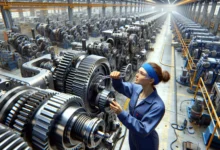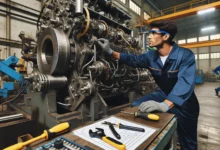Industrial Machinery Rentals: Save Costs, Boost Project Efficiency & Access the Latest Equipment
Advertisement
When I need to tackle a big project or meet a tight deadline, owning every piece of equipment just isn’t practical. That’s where industrial machinery rentals come in. They let me access the latest technology without the huge upfront investment or long-term commitment.
I’ve noticed more companies are turning to rentals to stay flexible and competitive. Whether I’m working in construction, manufacturing, or logistics, renting gives me the freedom to scale up or down as projects demand. It’s a smart way to keep operations running smoothly while managing costs.
Understanding Industrial Machinery Rentals
Renting industrial machinery involves choosing short or long-term equipment leases tailored for heavy-duty applications. I weigh options like excavators, cranes, forklifts, and compressors based on specific project needs. Leading rental companies usually offer maintenance, delivery, and technical support as part of the service.
I identify my project’s scope and deadlines to match machinery specifications. I compare rental inventory and contract terms from multiple providers such as United Rentals, Sunbelt Rentals, or Herc Rentals. I review equipment age, safety certifications, and the availability of support teams before signing any agreements.
I request transparent pricing that breaks down daily, weekly, and monthly costs, along with insurance and delivery fees. I also examine the option for upgrades or swaps if my project scope changes mid-term.
I keep detailed rental records and maintenance logs to streamline returns and avoid extra charges. I contact the provider’s technical hotline or service team whenever I encounter malfunctions or need rapid replacement. Industrial machinery rentals become efficient and hassle-free when I follow these steps, ensuring my projects stay on schedule and within budget.
Exploring Types Of Industrial Machinery Available For Rent
Renting industrial machinery covers a huge range of equipment across various sectors. I’ll break down the main categories you’ll find at most major rental providers.
Construction Equipment Rentals
Construction equipment rentals give me access to heavy machinery like excavators, bulldozers, backhoes, skid steers, and scissor lifts. I can find specialty items too, such as concrete mixers, compactors, and trenchers for roadwork and site prep. These machines from top brands like Caterpillar and John Deere let me handle demolition, earthmoving, and site development jobs efficiently without buying.
Manufacturing And Processing Machinery Rentals
Manufacturing and processing machinery rentals include CNC machines, lathes, injection molding units, and milling machines. I rent these for custom fabrication runs or to boost output during peak demand. Many providers supply automated packaging equipment, conveyor belts, and assembly robots. These rentals help me keep production lines moving without massive upfront investments.
Material Handling Equipment Rentals
Material handling equipment rentals cover forklifts, telehandlers, pallet jacks, and aerial work platforms. Renting lets me move, stack, and store pallets or oversized loads safely indoors or out. I often choose specific models from Hyster or Toyota for their reliability in warehouses, distribution centers, or on construction sites.
Power Generation And HVAC Rentals
Power generation and HVAC rentals include diesel and gas generators, industrial air conditioners, and portable heaters. I rely on these when jobsites have limited power infrastructure or face seasonal temperature swings. Rental fleets offer a range of capacities, letting me stabilize climate and keep systems running, even during planned shutdowns or emergencies.
Comparing Benefits Of Renting Versus Buying Industrial Machinery
I see key differences when weighing rental options against purchasing, especially for dynamic projects. Let me break down the main benefits I’ve seen with renting over buying.
Cost Savings And Financial Flexibility
I lower upfront costs by renting since I avoid hefty capital investments, which can exceed $100,000 for excavators, bulldozers, or CNC machines. I only pay for what I use, optimizing my cash flow instead of locking up funds in depreciating assets. I also skip property taxes, long-term loan interest, and resale headaches, which often come with machine ownership.
Access To Latest Technology And Equipment
I get immediate access to newer, more efficient equipment when I rent, whether I need advanced GPS-enabled graders or emissions-compliant generators. I don’t worry about my equipment becoming obsolete, as rental companies like United Rentals and Sunbelt Rentals frequently update inventories. This is crucial when project requirements change or strict regulatory standards apply.
Reduced Maintenance Responsibilities
I let rental providers handle regular and emergency maintenance, saving me significant time and labor costs. I don’t have to schedule inspections or train technicians on specialized systems—rental firms supply machines with current service records and compliance certificates. This keeps my projects moving, reduces downtime, and shifts liability away from me if mechanical issues occur.
Evaluating Key Factors When Choosing An Industrial Machinery Rental Provider
When I need industrial machinery rentals for a complex project, choosing the right provider becomes a big driver of my success. The decision’s not just about cost—the provider’s reputation, machinery quality, and support can make or break a project.
Reputation And Customer Reviews
I always check the provider’s reputation before renting. Reliable companies like United Rentals, Sunbelt Rentals, and Herc Rentals consistently earn strong customer reviews for timely delivery and clear billing. I read recent client feedback on Google, Trustpilot, and industry forums to weed out providers with poor service records or slow equipment turnaround times.
Equipment Quality And Availability
I only rent from providers with modern, well-maintained fleets. Leading companies display detailed machine specs and age right on their websites. I verify that all equipment is certified for safety and regularly serviced, so my team avoids breakdowns that cost time and money. Large rental inventories help me secure uncommon or specialized machinery, even on short notice.
Rental Terms And Support Services
I review every rental contract line by line. Flexible rental periods let me match machinery rental to tight project schedules or sudden shifts in demand. Transparent pricing, clear policies on maintenance, and 24/7 support are must-haves for me. Top rental providers offer rapid on-site repairs and easy equipment swaps, so emergencies never leave me stuck or off schedule.
Navigating The Rental Process For Industrial Machinery
I know getting started with industrial machinery rentals takes more than picking a provider. You’ll need a clear process to secure equipment efficiently and stay compliant.
Steps To Secure Your Equipment Rental
- Define precise project requirements
I always list out machine specs, quantities, and job site timelines before I start—think 5-ton excavators or 10,000-lb forklifts and rental timeframes from two days to six months.
- Research reputable suppliers
I compare major vendors like United Rentals, Sunbelt Rentals, and Herc Rentals for in-stock options, equipment age, and local branch support.
- Request a detailed quote
I ask for itemized pricing, delivery charges, fuel policies, and extra fees. That way, I make sure costs match my budget before I commit.
- Book and confirm equipment reservations
I reserve machinery early, especially for specialized gear or peak construction months. Most suppliers require a signed agreement and deposit.
- Schedule delivery and inspections
I arrange delivery to the worksite and conduct a joint inspection with the rental provider. I record equipment condition in photos and notes to document pre-rental status.
- Coordinate ongoing communication
I maintain direct contact with my vendor’s rep for support, maintenance, or equipment swaps as my project evolves.
Important Documentation And Insurance Requirements
- Signed rental agreement
I review terms for rental period, responsibilities, and costs to avoid hidden fees.
- Proof of company insurance
I provide Certificates of Insurance (COIs) that meet the rental company’s minimum coverage for liability and equipment damage, often $1M or higher.
- Operator certifications
I verify my team’s credentials if using specialized equipment, such as OSHA certification for forklifts or aerial lifts.
- Maintenance and inspection records
I request recent maintenance logs or annual inspection certificates. These keep my operation safe and compliant.
- Damage waiver or loss protection
I add damage waivers to shield my business from unexpected repair bills caused by accidental damage.
| Required Documentation | Purpose | Example Requirement |
|---|---|---|
| Signed Rental Agreement | Terms and responsibilities | Minimum 1-week rental period |
| Certificate of Insurance (COI) | Liability/equipment damage coverage | $1,000,000 general liability |
| Operator Certifications | Legal compliance/safety | OSHA Lift Certification |
| Maintenance Records | Verify equipment safety | Annual inspection report |
| Damage Waiver/Protection | Limit liability for damages | Added fee per rental |
By following these rental process steps and gathering the right documents, I keep my projects compliant, on budget, and running smoothly.
Calculating Industrial Machinery Rental Costs
Accurately estimating rental costs helps me avoid project overruns and maintain financial control. Every rental agreement comes with unique pricing elements, so understanding the breakdown ensures I get the best value.
Pricing Factors And Fee Structures
Rental periods set the baseline for cost calculations. Most suppliers charge daily, weekly, or monthly rates, and longer terms usually unlock bigger discounts. Equipment type significantly affects rates—specialty machines like cranes or high-capacity forklifts cost more than standard loaders or generators.
Delivery and pick-up fees appear on almost every quote. I also factor in fueling, cleaning, mileage, and operating hour overages, as these hidden costs can add up quickly. Damage waivers or insurance charges apply to most contracts and protect both parties from unexpected incidents.
Here’s a quick look at typical cost ranges for industrial machinery rentals:
| Equipment Type | Daily Rate ($) | Weekly Rate ($) | Monthly Rate ($) | Common Extra Fees ($) |
|---|---|---|---|---|
| Excavator | 250–700 | 1,000–2,200 | 3,000–7,500 | Delivery (150–400), Fuel |
| Forklift | 100–300 | 350–1,000 | 900–2,500 | Damage waiver, Delivery |
| Generator | 75–350 | 250–850 | 700–3,000 | Fuel, Insurance |
| Industrial HVAC | 100–500 | 350–2,000 | 900–6,000 | Delivery, Cleaning |
Sources: United Rentals, Sunbelt Rentals, Herc Rentals (2024)
Tips For Budgeting And Saving Money On Rentals
Comparing quotes from multiple suppliers lets me spot the best deals. Negotiating rates, especially for longer projects or multiple machines, almost always yields savings.
Booking well in advance secures preferred equipment and typically lowers rates. Bundling rentals—like mixing forklifts with generators—often lets me negotiate package discounts. I always return equipment on time and in clean condition to dodge late or cleaning charges.
Tracking actual equipment usage prevents me from paying for unnecessary rental days, especially on faster-moving phases of the project. Lastly, choosing newer, well-maintained machinery limits surprise breakdowns and extra repair fees during the rental period.
Following Safety Guidelines For Industrial Machinery Rentals
Staying safe with industrial machinery rentals protects both my team and investment. I always follow established safety protocols to meet legal requirements and keep operations running smoothly.
Training And Certification Requirements
Ensuring all operators are trained and certified tops my priority list for industrial machinery rentals. Rental companies—like Sunbelt Rentals and United Rentals—often require proof of operator certification for equipment such as forklifts, aerial lifts, and cranes. I always verify that my operators have valid certifications, such as OSHA-compliant forklift licenses or rigging certificates, depending on the rented gear. Reviewing machine-specific training materials and manufacturer’s manuals before use helps minimize accidents and avoid company liability.
Inspection And Safety Checklists
Completing a thorough inspection and safety checklist before each use ensures the rented machinery is safe and compliant. I examine all critical functions: brakes, lights, hydraulics, and safety guards, plus fluid levels and visible damage. I always use provider-supplied or OSHA-recommended checklists tailored to each equipment category—like daily aerial lift inspections or pre-operation heavy equipment checklists. Documenting every inspection and immediately reporting any issues to the rental provider decreases breakdown risks and helps me stay aligned with company policy and insurance terms.
Conclusion
Industrial machinery rentals have changed the way I approach large-scale projects. With so many options available and the ability to scale up or down as needed I can tackle demanding jobs without worrying about massive investments or equipment downtime.
By working with trusted providers and following best practices I stay confident that my projects will run efficiently and safely. Rentals give me the freedom to focus on results while keeping costs and risks under control.
Frequently Asked Questions
What are the main benefits of renting industrial machinery for big projects?
Renting industrial machinery provides companies with access to the latest technology, reduces upfront costs, and offers flexibility for changing project needs. It also lowers maintenance responsibilities, supports efficient cash flow, and lets companies scale operations based on demand.
Which industries commonly rent industrial machinery?
Industries such as construction, manufacturing, logistics, and warehousing frequently rent industrial machinery to meet project demands, manage expenses, and maintain operational flexibility.
What types of industrial machinery can be rented?
You can rent various types of machinery, including construction equipment (excavators, bulldozers), manufacturing machinery (CNC machines, packaging equipment), material handling equipment (forklifts, telehandlers), and power generation or HVAC units (generators, industrial air conditioners).
How does the industrial machinery rental process work?
The process involves defining your needs, comparing providers, requesting detailed quotes, selecting suitable equipment, securing a rental agreement, and scheduling delivery and inspections. Ongoing communication and documentation management help ensure smooth rentals.
What should I look for when choosing a machinery rental provider?
Key considerations include the provider’s reputation, equipment quality, customer reviews, transparent pricing, flexible rental terms, and support services such as quick repairs and easy equipment swaps.
How are industrial machinery rental costs calculated?
Rental costs are based on equipment type, rental duration, and additional fees like delivery, fuel, and insurance. Comparing multiple quotes, booking early, and tracking usage can help you stay on budget.
Is renting industrial equipment more cost-effective than buying?
For most dynamic projects, renting is more cost-effective. It avoids large upfront investments, provides flexibility, prevents equipment obsolescence, and reduces maintenance expenses compared to owning machinery.
What safety measures should be taken when renting industrial machinery?
Ensure all operators are properly trained and certified. Conduct thorough equipment inspections, follow safety checklists, and maintain detailed documentation to comply with safety standards and prevent accidents.
What documents are needed to rent industrial machinery?
Commonly required documents include a signed rental agreement, proof of insurance, operator certifications, maintenance records, and a damage waiver. These documents help ensure compliance and protect your business.









